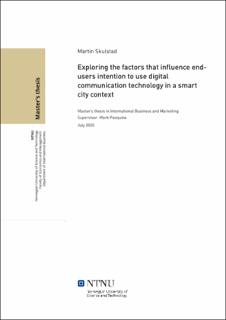| dc.contributor.advisor | Pasquine, Mark | |
| dc.contributor.author | Skulstad, Martin | |
| dc.date.accessioned | 2021-09-14T17:04:59Z | |
| dc.date.available | 2021-09-14T17:04:59Z | |
| dc.date.issued | 2020 | |
| dc.identifier | no.ntnu:inspera:59703510:49062383 | |
| dc.identifier.uri | https://hdl.handle.net/11250/2776878 | |
| dc.description.abstract | De siste årene har konseptet Smarte Byer vokst fram. Og med en stadig økende oppmerksomhet over hele verden som en lovende respons på byenes bærekraftige utfordring. Basert på omfattende lesing fra tidligere literatur, ser mange lokalsamfunn og byer et økt potensial i sammarbeidsdrivende og deltakende sammfunnsdrevne initiativer for å skape framtidens Smarte Byer. Forskning viser at en av de viktigste faktorene for å lykkes med et smart by-prosjekt er å sette innbyggerne i sentrum. Ved å kartlegge og lytte til innbyggernes syn på hvordan smartere, tryggere og mer bærekraftige samfunn kan utvikles. Ved å identifisere tiltak og løsninger som kan forbedres ved bruk av ny teknologi og effektivisere tilbudet av tjenester som vil bidra til bedre og grønnere bo og arbeidsmiljøer.
Denne studien integrer den betydelige litteraturen om technology acceptance models i smart city-diskursen for å begynne å imøtekomme dette behoved. Derav å undersøke innbyggernes hensikt i å ta i bruk digital kommunikasjonsteknologi gjennom sine smarttelefoner for å forbedre kommunikasjonen og innbyggerdeltakelsen i en smart by kontekst. En kvantitativ forskningsstrategi ble anvendt i denne stuiden, hvor en dataprøve på 121 respondenter ble utført.
Et nytt rammeverk ble benyttet og testet på dette utvalget. Imidlertid fant denne studien ingen støtte for dettte rammeverket. Basert på resultatene fant en at ni av ti faktorer ikke hadde noen betydelig innvirkning på respondentenes intensjon om å ta i bruk en slik tjeneste. Men, resultatene fra studien avdekket betydelig støtte for de veletablerte TAM-variablene, og en ny forenklet modell ble etablert og testet. Den foreslåtte modellen ble utviklet og testet med spesifikk referanse til en liten by i Norge. | |
| dc.description.abstract | In recent years, the concept of smart cities has come to the fore. And it is rapidly gaining momentum and worldwide attention as a promising response to the challenge of urban sustainability. Based on extensive reading from previous literature many local communities and cities are seeing an increased potential in collaborative and participatory community-driven initiatives in order to create future Smart Cities. Researchers has seen that one of the most important factors for succeeding with a Smart City project is by putting the citizens at the centre. By mapping and listen to the citizen’s views on how smarter, safer and more sustainable communities can be developed. Identifying measures and solutions that can improve with the help of new technology and streamline the provision of services, and which contributes to better and greener living and work environments.
This study integrates the substantial literature on technology acceptance modelling into the Smart City discourse to begin to address this need. Hereby looking into citizens intention to adopt and use digital communication technology through their smartphones in order to improve communication and citizen participation in the context of Smart City. A quantitative research strategy was applied in this study, investigating a data sample from 121 respondents.
A proposed conceptual framework containing ten propositions is presented and tested on this sample. However, this study found no support for this framework as nine out of ten factors had no significant impact on intention to use. Evidence obtained from the study revealed significant support for the well-established TAM variables and a new parsimonious model was established and tested. The proposed model is developed and tested with specific reference to a small city in Norway. The paper will help in understanding the key issues surrounding end-user’s adoption of mobile applications that may support the successful development of future Smart Cities. | |
| dc.language | | |
| dc.publisher | NTNU | |
| dc.title | Exploring the factors that influence end-users intention to use digital communication technology in a smart city context | |
| dc.type | Master thesis | |
